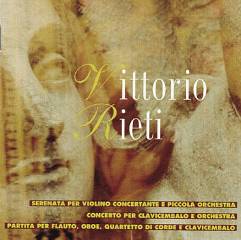Vittorio Rieti - Music of Vittorio Rieti (1991)
Vittorio Rieti - Music of Vittorio Rieti (1991)

1. Partita for flute, oboe, string quartet & harpsichord I. Introduzione e Pastorale variata II. Scherzino; Vivace III. Aria: Andante mesto IV. Fuga cromatica: Allegro moderato V. Giga: Allegro Sylvia Marlowe, harpsichord Samuel Baron, flute Ronald Roseman, oboe Charles Libove, Anahid Ajemian, violin Harry Zaratzian, viola Charles McCraken, violoncello 2. Concerto per clavicembalo e orchestra I. Adagio - Allegro moderato II. Allegro scherzando; Allegro non troppo alla Tarantella Sylvia Marlowe, harpsichord Chamber Orchestra 3. Serenata for violin & chamber orchestra I. Allegro II. Cadenza - Adagio e Siciliano III. Allegretto - Allegro vivace Janet Packer, violin Longy Artists Ensemble Melvin Strauss – conductor
Although an Italian native, composer Vittorio Rieti was born in Alexandria, Egypt; his early music studies were taken as secondary to a course in economics at the University of Milan, where Rieti earned his diploma in 1917. Conscripted for a short time into the Italian army during World War I, he resumed his music studies with Alfredo Casella after the war and composed his first works in an experimental, near atonal style. His work gained the attention of Arnold Schoenberg, who frequently programmed them at ISCM concerts and helped Rieti win a publishing contract with Universal Edition. However, by the time he joined the staff of Sergei Diaghilev's Ballet Russes in Paris in 1925, Rieti had shifted to a more neo-classical vein in the manner of Stravinsky, who became his close friend. Rieti enjoyed a high profile in the years leading up to the Second World War, but its outbreak caused him to flee to the United States in 1940.
Once in the U.S., Rieti picked up right where he left off, writing ballets for George Balanchine and having his works performed by major conductors and orchestras. Unlike Stravinsky, however, Rieti's music began to experience an eclipse starting in the 1950s. Just before that, Rieti had begun to teach, first at Peabody and later in Chicago, concluding with professorships at Queens College and the New York College of Music. Rieti enjoyed a long retirement, and continued to compose right up until his death in 1994 at the age of 96.
Vittorio Rieti left an impressive body of work: seven operas, 11 symphonies, and 11 string quartets in addition to numerous ballets, chamber works, songs, piano pieces, and choral settings. In a stylistic sense, Rieti never wandered very far from the neo-classic sound he'd cultivated since 1925. Considerations of historical relevance aside, Rieti was a highly skillful composer with a great sense of concision and balance. In his American works, Rieti managed to bring an element of old-world charm into pieces that still successfully adopt some of the sass and bite typical to American concert music of the 1940s. His Second Avenue Waltzes (1942) beautifully evokes the feeling of being an immigrant in America, living in Hell's Kitchen, and perhaps the breeze lifting the curtain in a kitchen window. --- Uncle Dave Lewis, Rovi
download: uploaded yandex 4shared mediafire solidfiles mega filecloudio nornar ziddu
Zmieniony (Wtorek, 08 Kwiecień 2014 19:10)








